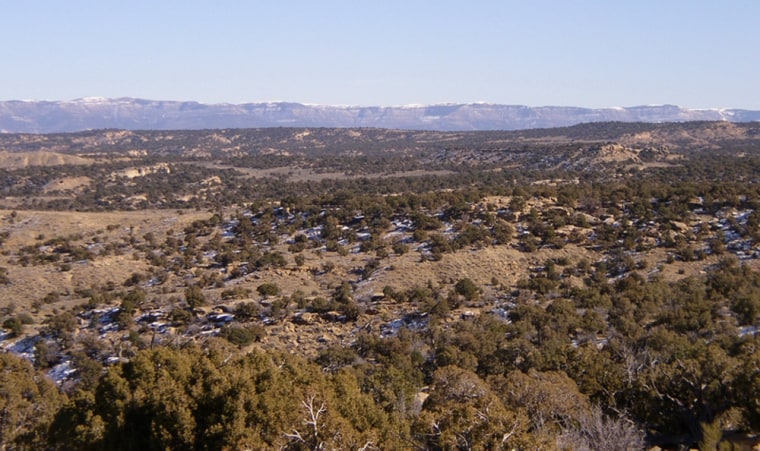Companies hoping to tap an estimated 100-year supply of shale oil locked in rock formations under Colorado, Utah, and southwest Wyoming have won federal approval for experimental extraction projects.
The decision comes despite comments from state and federal agencies and environmentalists that threats to air and water were understated or not adequately analyzed.
Not since the 1980s have companies been as interested as they are now in extracting oil from the rock, which has historically been a laborious and expensive process.
The Interior Department authorized 10-year leases for Shell Frontier Oil & Gas Co., Chevron USA and EGL Resources Inc. for 160-acre parcels for research and development projects in northwest Colorado.
The companies must submit detailed development plans, monitor groundwater, and obtain all required permits to protect air and water quality, the department said Monday in its decision.
The projects could begin as early as next summer.
Rods, pipes used underground
Since 1996, Shell has tested procedures on private land in western Colorado that involve baking shale rock in the ground with electric heating rods, then pumping the melted oil to the surface. The plan is to circulate refrigerants such as ammonia dioxide through underground pipes to freeze adjacent areas to keep groundwater away from the melted oil.
Earlier this year, the Bureau of Land Management declared the projects would have no significant environmental impact. In authorizing the leases, the Interior Department agreed with that assessment.
“These R&D projects will allow us to test our belief that we have the knowledge and expertise to develop this resource effectively, economically and with the responsibility to the environment and to local communities,” said C. Stephen Allred, assistant Interior secretary for land and minerals management.
The challenge is extracting the oil locked in rock formations. Previous attempts to bake oil from the shale in a furnace haven't worked or have been too expensive.
Concern about wildlife, substances
Not in agreement were the White River National Forest supervisor and the Colorado Department of Public Health and Environment, which said the BLM had understated threats to air quality in the Flat Tops Wilderness.
In comments obtained by Boulder-based Western Resource Advocates through the Freedom of Information Act, the Colorado Division of Wildlife said all the projects, including Shell's three parcels of 160 acres each, are in or next to elk and mule deer winter and summer range and migration routes and sage grouse habitat.
There wasn't enough information about the effects on streams and groundwater to ensure protection of fish, including Colorado River cutthroat trout, listed by the state as a species of special concern, the Division of Wildlife wrote in comments to the BLM.
The DOW and the U.S. Geological Survey also said information was inadequate on the kinds of substances that will be released. The USGS said in Sept. 14 letter to the BLM the kind of detail needed to judge the analysis and assess potential impacts on water isn't available.
"I'm concerned that the BLM didn't take seriously the comments that various experts expressed," said Bob Randall, staff attorney for Western Resource Advocates, an environmental law and policy group.
Vow to keep eye on fish
BLM spokesman Vaughn Whatley said the comments from the Forest Service and state health department prompted the agency to take a "hard look" at the data, which was clarified but didn't change the overall environmental analysis.
The BLM said in its environmental assessments that a potential drop in groundwater levels on the test sites proposed by Shell could adversely affect four endangered Colorado River fish. The agency said it would consult with the U.S. Fish and Wildlife Service on reducing the effects on the fish: the bonytail, Colorado pikeminnow, humpback chub and razorback sucker.
A decision on the environmental impact of a project near Vernal, Utah, proposed by Oil Shale Exploration Co. is pending before the BLM.
Utah's is the only mining project where oil shale will be brought to the surface, crushed into gravel and fed into a furnace-like retort. The White River Mine was abandoned by three major oil companies in 1985 when falling crude prices made shale oil — long an elusive bonanza in the West — uneconomical.
High energy prices and the Bush administration's push for more domestic energy production have spawned the latest quest to tap the supply of shale oil underneath Colorado, Utah and southwest Wyoming.
